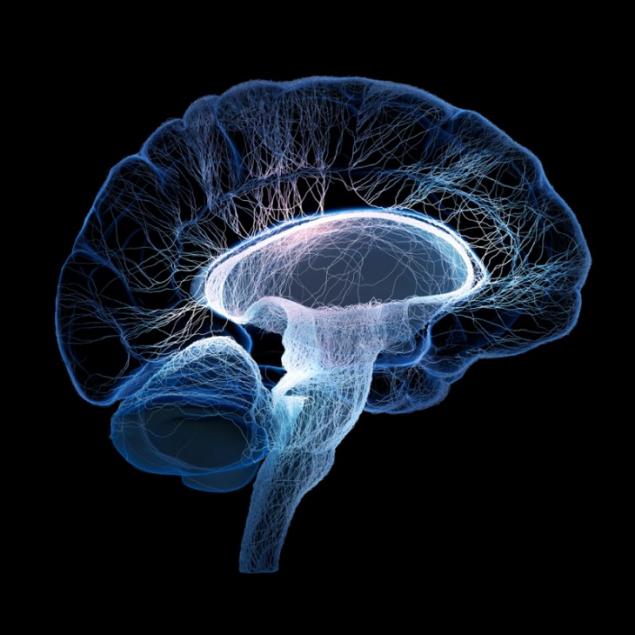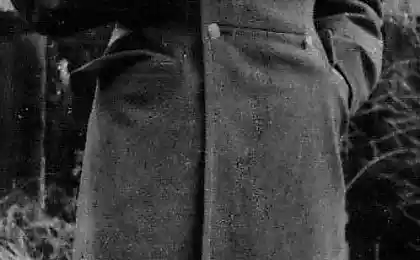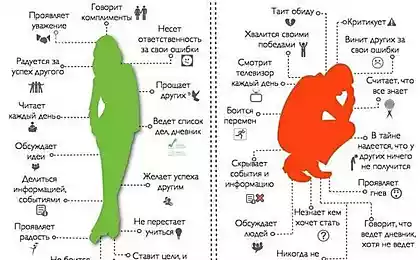736
10 facts about us, in that then you will not believe
We humans are so complex that most of the processes in the brain occur without our conscious intervention. Psychologist Susan Ueynshenk exploring the features of our behavior and wrote why we are doing so, and not otherwise. < Website for you to publish a selection of amazing facts about how the brain works.

1. Infinitely google makes us dopamine h2> To be honest, you can just ignore the letter? And it happened that you zaguglit answer to the question, and 30 minutes later realized that the reading has a different story? It's dopamine.
2. We can keep in mind the 3-4 things at a time h2> For the time (about 20 seconds), you can keep in mind only 3-4 things. Then, they will disappear from memory, if not to repeat them again and again.
3. We want to have a choice, but tsepeneya when the selection is too large h2> In any supermarket so many goods because people need a huge selection. At least that's what we are thinking about ourselves. In fact, we are paralyzed with indecision, If the choice is too large
4. We can not ignore food, sex and danger. Rubbish h2> You may have noticed that by accident people always go slowly, even if the road is clear, no obstacles. What's so interesting about someone else's misfortune? We even run the risk of seeing something horrible, because of which will not be able to sleep then.
«The human brain" - is responsible for awareness, logic and reasoning. We think that we are led exactly it. «mammalian brain" - processes emotions. «reptilian brain" - cares about survival. «I can eat? To do with this man have sex with? It can kill me? ».
Food, sex and the risk associated with survival. Millions of years ago, the brain only know and care. We inherited it.
No matter how much we try to consciously ignore food, sex and danger. We do not necessarily eat chocolate cake, does not necessarily begin to flirt with a beautiful girl and does not necessarily try to get away from her boyfriend hefty - but we do all that we observe.
5. Brands are turning to our reptilian brain h2> you are planning to buy a new TV. What choose: a familiar brand of expensive or obscure «no name» is much cheaper?
6. The strange situation we are always looking at other people h2> Are you looking for online boots. One couple in the photo you like, it is necessary to read the reviews. Most of the reviews are positive, but there are a few negative. To buy or not?
7. Most of all, our attention is drawn to pictures of people h2> Animation is not in the bill. From stationary objects photos of people attract our attention in the first place. Even when the image disappears (for example, we flip through the bottom of the page of the site), we automatically look at the same point for a few seconds.
8. Intuition and logic? It depends on the mood h2> A man takes a decision based on logic or intuition? How effective?
9. Our mind wanders 30% of the time h2> You are viewing a report on the work and suddenly realize that re-read one sentence for the third time. Rather than thinking about the content of the text, your mind wanders.
10. Even the illusion of progress - is strong motivation h2> In the local cafe you gave loyalty card. Every time you buy a coffee, put a stamp on the card. Dialed the right number of stamps - get a cup for free.

1. Infinitely google makes us dopamine h2> To be honest, you can just ignore the letter? And it happened that you zaguglit answer to the question, and 30 minutes later realized that the reading has a different story? It's dopamine.
Dopamine is not only responsible for the pleasure of eating and sex. He awakens in us the desire to seek a solution that increases the excitement of the process of the search. From the point of view of evolution it is very important - so dopamine leads us to explore the world and survive in it. He also is responsible for the "sense of reward" - we are proud of themselves when done.
The Internet has given us an opportunity to find a solution almost instantly. You want to know how your friends are there - one click and you're already on Facebook. In one click increases the level of dopamine; we are pleased to click and do anything about it, we can not.
Twitter even more pleasant thanks to the 140 symbols: the less information is supplied at a time, the greater the level of dopamine.
Another dopamine system encourages unpredictability: we know that we get a letter, but do not know when. The same case - a foretaste of praise for a job or waiting for results on the slot machine.
However, from the information overload we get tired. So in the endless cycle of dopamine hardly would get.
2. We can keep in mind the 3-4 things at a time h2> For the time (about 20 seconds), you can keep in mind only 3-4 things. Then, they will disappear from memory, if not to repeat them again and again.
Imagine you you stir something in a pot and at the same time talking on the phone. You dictate the number, which urgently needs to call back, but there is no place to write - an old phone and a pen in the other room. It is necessary to remember.
Room is divided into 4 parts: 712-569-45-32.V this form you and repeat it to myself again put in the memory unit 4 new 20 seconds. If you are dictated to him as 7-1-2-5-6-9-4-5-3-2, each digit individually, remember the sequence would be more difficult. It is even harder to read.
It is convenient to work with the bookmarks in your browser, 3-4, 3-4 to the menu on the site. If it is necessary to work with large amounts of information, it is best to combine groups of 3-4. Then it is easier to keep attention.
3. We want to have a choice, but tsepeneya when the selection is too large h2> In any supermarket so many goods because people need a huge selection. At least that's what we are thinking about ourselves. In fact, we are paralyzed with indecision, If the choice is too large
The store staged a tasting: put on the table 6 jars of jam and asked everyone to try. And then put on the table 24 cans.
When the jars were 6, 60 people out of 100 (it is clear that there were more, but the number 100 graphically) stopped and tried, 18 people decided to buy the jam. When the jars became four times and stopped only 40 people out of 100, and only two have made the purchase.
But why we demand a great choice? This again dopamine - information search is addictive. We stop to look, only if completely sure of the answer. Less cans - less than the search area - it is easier to decide and buy.
By the way, in both cases, people have tried all sorts of 3-4.
4. We can not ignore food, sex and danger. Rubbish h2> You may have noticed that by accident people always go slowly, even if the road is clear, no obstacles. What's so interesting about someone else's misfortune? We even run the risk of seeing something horrible, because of which will not be able to sleep then.
Blame "reptilian brain».
We have three kinds of brain:
«The human brain" - is responsible for awareness, logic and reasoning. We think that we are led exactly it. «mammalian brain" - processes emotions. «reptilian brain" - cares about survival. «I can eat? To do with this man have sex with? It can kill me? ». Food, sex and the risk associated with survival. Millions of years ago, the brain only know and care. We inherited it.
No matter how much we try to consciously ignore food, sex and danger. We do not necessarily eat chocolate cake, does not necessarily begin to flirt with a beautiful girl and does not necessarily try to get away from her boyfriend hefty - but we do all that we observe.
5. Brands are turning to our reptilian brain h2> you are planning to buy a new TV. What choose: a familiar brand of expensive or obscure «no name» is much cheaper?
We already know about the reptilian brain. It is for security - he was afraid of losing the potential benefits.
Brand means safety. If for some reason a brand we like the reptilian brain signals: a good thing, you know! But if 15 years ago we broke Panasonic, we will not soon buy a thing of the brand, even though really do not remember that we so upset. The reptilian brain is firmly learned that the brand is unreliable.
If we choose the item online, the brand becomes a decisive factor. We can not touch it, and can only be guided by line. And for guests.
6. The strange situation we are always looking at other people h2> Are you looking for online boots. One couple in the photo you like, it is necessary to read the reviews. Most of the reviews are positive, but there are a few negative. To buy or not?
We tend to look at other people, if you do not know what to do. This is called the craze.
Psychologists have conducted an experiment with smoke. Man asked to fill out a form and left in a room with other people. He is one sincerely believed that simply fills in the questionnaire here, others were dummies.
Then let the smoke in the room - there is a potential danger. The subject does not know what to do, and looked at the other people in the room. If they ignored the smoke, he calmed down and continued to do their work. If he had one, you usually leave the room to warn others about smoke blanketing.
So most likely, we will buy shoes, especially if we see the emotional comments or whole stories about these boots. Stories say our "mammalian brain", evoke emotion, and we really love.
We want to think that, regardless of other people's opinions, but, unfortunately, it is very easy to fall under foreign influence. We just need the right push.
7. Most of all, our attention is drawn to pictures of people h2> Animation is not in the bill. From stationary objects photos of people attract our attention in the first place. Even when the image disappears (for example, we flip through the bottom of the page of the site), we automatically look at the same point for a few seconds.
Hardest on the face attracts the eye. Do you want to grab the attention of the visitor - put on the page close-up face that looks directly at the camera
Part of our brain is responsible for the recognition of human faces, as well as recognition of the emotions. So we immediately zasmotrimsya on evil and scary face: the brain will react to potential danger.
8. Intuition and logic? It depends on the mood h2> A man takes a decision based on logic or intuition? How effective?
Studies show that if it is necessary to adopt a simple solution, more efficient use of the logical approach. If it is difficult - to trust intuition. When difficult decisions difficult for us to consciously take into account all the facts, so that it is more logical to allow the subconscious to handle it for us.
In the decision also affects mood. If in a good mood, it is better to trust intuition. If the bad - the logic. In a bad mood, we all seem worse than it really is, so that we subconsciously we cherish and take into account the negative factors.
9. Our mind wanders 30% of the time h2> You are viewing a report on the work and suddenly realize that re-read one sentence for the third time. Rather than thinking about the content of the text, your mind wanders.
Wandering mind and dreams - not the same thing. When you dream, you represent something specific: how to go to the Dominican Republic or become famous. A wandering mind - when you think about the report, and then suddenly thought themselves went to the side, and you're thinking about something else, and do not even know what it is.
This is normal. Our mind wanders 30% of the time. Moreover, it is good: because the brain can focus on one part is not too difficult, and partly to handle other tasks. For example, you read the report, and colleagues at the same time figure out what to give for an anniversary aunt.
Worse, most of the time, we do not even realize that the mind wanders
10. Even the illusion of progress - is strong motivation h2> In the local cafe you gave loyalty card. Every time you buy a coffee, put a stamp on the card. Dialed the right number of stamps - get a cup for free.
Two options:
On a free cup to collect 10 stamps. When you get the card, there is not a single. On a free cup of need 12 stamps. The map stamped 2. Question on a map, you will save up for a free cup?
It seems that there is no difference: and there, and there is left to accumulate 10 stamps. But most of us will start to fill in the card B. The reason for this behavior - effect is closer to the target
In 1934, Clark Hull an experiment on rats. It is placed in a familiar rat maze in arbitrary place. Rats that are closer to the end of the labyrinth and, respectively, to the food, it ran faster.
The closer we get to the goal, the faster we act. The closer the target, the greater our motivation.
Even the illusion of progress increases the motivation, as in the example with the cards: a card, and still have to do so much, but on the map B someone has tried for us, there is progress.
So I think then how far we have come from animals.
via www.adme.ru/svoboda-psihologiya/10-faktov-o-nas-s-vami-v-kotorye-tak-srazu-i-ne-poverish-1115360/
10 fascinating facts about the music
10 facts from the life of Hitler, who could change the course of history
























